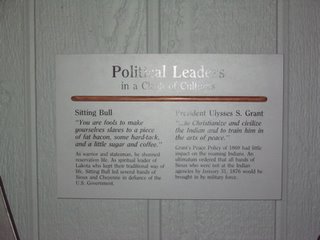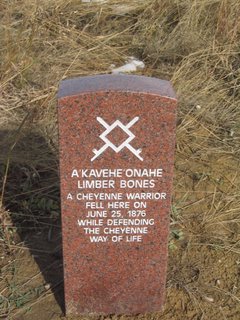Here's what Bush is expected to say at tomorrow night's State of the Union address and what you need to know from the American Progress Action fund. Be sure to check
their site for links to the following stories and to sign up for daily updates.
Alternative Energy
What Bush Will Say: "I agree with Americans who understand being hooked on foreign oil is an economic problem and a national security problem." [1/29/06]
What You Need to Know: For five years, President Bush has consistently steered the nation away from alternative fuels and towards greater dependence on polluting imported fossil fuels.
BUSH HAS INCREASED DEPENDENCE ON FOREIGN OIL: Sixty-six percent of oil consumed in the United States comes from foreign sources, up from 58 percent in 2000. Americans now spend $200,000 a minute on foreign oil, and more than $25 billion annually goes to Persian Gulf states for oil imports.
BUSH ENERGY BILL CONTAINED LITTLE ON RENEWABLE ENERGY: The energy bill supported and signed by President Bush dropped a provision that would have required utilities "to generate at least 10 percent of their electricity through renewable fuels by 2020." The proposal, championed by Sen. Jeff Bingaman (D-NM), "was a low-cost, market-driven approach to cutting demand for fossil fuels and easing air pollution."
BUSH ENERGY BILL WILL NOT REDUCE RELIANCE ON FOREIGN OIL: The same energy bill failed to take any steps that will substantively reduce America's dependence on foreign oil. Specifically, the final version "rejected a Senate provision that required reduction of oil consumption by one million barrels per day by 2015." Under the bill, "our need for imported oil will continue to grow for as long as models are able to project."
Warrantless Domestic Spying
What Bush Will Say: "The terrorist surveillance program is necessary to protect America from attack." [1/26/05]
What You Need to Know: President Bush's warrantless domestic spying program undermines the fight against terrorists and violates the law.
LAWLESS SPYING THREATENS LEGITIMATE TERRORIST INVESTIGATIONS: When laws are broken, the legal system imposes consequences. Revelations about the National Security Agency wiretapping program throw into doubt a wide range of investigations and prosecutions in the fight against terrorism. In criminal cases that can put terrorists behind bars, judges now have to worry that evidence was based on illegal wiretaps. According to several FISA judges quoted by the Washington Post, there are serious concerns that "legally suspect information" acquired through warrantless surveillance was used to obtain FISA warrants, potentially rendering the warrants illegitimate. More broadly, convicted terrorists will be emboldened to challenge their prosecutions, perhaps giving them the opportunity to operate freely once again. [Washington Post, 12/21/05]
LAWLESS SPYING WASTES VALUABLE INVESTIGATIVE RESOURCES: According to the New York Times, a massive amount of time and resources were devoted to the warrantless domestic spying program but obtained minimal results. The FBI was bombarded with long lists of phone numbers generated by the NSA program. According to a senior prosecutor: "It affected the F.B.I. in the sense that they had to devote so many resources to tracking every single one of these leads, and, in my experience, they were all dry leads." Long after 9/11, "the N.S.A. material continued to be viewed as unproductive, prompting agents to joke that a new bunch of tips meant more calls to Pizza Hut." [New York Times, 1/17/06]
LAWLESS SPYING THREATENS THE CONSTITUTIONAL SYSTEM OF CHECKS AND BALANCES: The Bush Administration is claiming executive power far beyond our historical understanding. Among recent examples: the administration claims it can wiretap without a warrant in the United States, contrary to federal law (FISA); it can torture, contrary to international law and the recent McCain Anti-Torture Amendment; and it can hold a U.S. citizen in detention forever, with no judicial review, simply because the President labels the citizen an "enemy combatant." These positions constitute a direct attack by the executive branch on the checks and balances designed to protect our nation's democracy.
Making Tax Cuts Permanent
What Bush Will Say: "Of course, we'll talk about fiscal policy in my State of the Union, talking about the Congress to be wise about how we spend the people's money and to make the tax cuts permanent." [1/26/05]
What You Need to Know: Making President Bush's tax cuts permanent would harm the economy and worsen the nation's poor fiscal health.
TAX CUTS WILL COST $3.4 TRILLION OVER TEN YEARS: The cost of making the tax cuts permanent will be $3.4 trillion through fiscal year 2015, according to Congressional Budget Office (CBO) estimates. This includes the cost of extending the Alternative Minimum Tax relief associated with these tax cuts. [Congressional Budget Office, 1/26/06]
DEFICITS CAUSED BY TAX CUTS NEGATE ANY POTENTIAL ECONOMIC BENEFITS: Studies by the Joint Committee on Taxation (JTC), Organisation for Economic Co-operation and Development (OECD), and CBO all confirm that deficits undermine economic benefits of the cuts. In their analysis of the 2003 tax cuts, JTC found that any economic benefits of the tax cuts would "eventually likely to be outweighed by the reduction in national savings due to increasing Federal government deficits." Four of the five models they used showed a negative effect on real GDP by the next decade, while the fifth showed no impact at all. CBO and OECD studies confirmed the tax cuts would raise deficits and hurt growth. [American Progress analysis, 1/26/05; CBO, October 2005]
PERMANENT TAX CUTS OVERWHELMINGLY FAVOR THE WEALTHIEST: Estimates based on data from the Urban Institute-Brookings Institution Tax Policy Center show that if the tax cuts are made permanent, the top 1 percent of households will gain an average of $71,420 a year when the tax cuts are fully in effect, reflecting a 6.5 percent change in their after-tax income. By contrast, people in the middle of the income spectrum would secure just a 2.1 percent increase in their after-tax income, with average tax cuts of $870. [Tax Policy Center, 12/20/05]
Katrina Reconstruction
What Bush Will Say: "I'm going to remind people we show the character and compassion of America by taking focused action...to help devastated areas of our country that have been -- areas that have been devastated by natural disasters." [1/26/05]
What You Need to Know: The Bush administration has bungled the reconstruction efforts and is failing to support New Orleans' reconstruction plan.
KATRINA RECONSTRUCTION HAS BEEN SLOW AND BUNGLED: If New Orleans is to thrive, let alone survive, people must be able to return. They cannot do so under current conditions. The Washington Post's Eugene Robinson accurately notes, "the longer the city sits empty and ruined, the less likely its renaissance becomes. Who but the president can break the logjam?" Whole sections of New Orleans still "resemble a moonscape," and only around one-fifth of the city's original population has resettled. Despite Bush's claims that New Orleans is "a heckuva place to bring your family," many "neighborhoods still are abandoned wastelands of uninhabitable homes and sidewalks piled with moldy garbage."
KATRINA RECONSTRUCTION FUNDING HAS BEEN TAINTED BY POLITICS: The $29 billion in aid passed last month was tainted by politics: the package "gave Mississippi about five times as much per household in housing aid as Louisiana received," a "testimony to the clout" of Bush's political ally, conservative Mississippi Gov. Haley Barbour (R).
ADMINISTRATION REJECTED RECONSTRUCTION PLAN: President Bush said at last week's press conference, "It's important for New Orleans and the state of Louisiana to work together to develop a state recovery plan. ... The plan for Louisiana hasn't come forward yet." In fact, Louisiana did come up with a plan - which the White House rejected. Rather than supporting the "most broadly supported plan for rebuilding communities," Bush instead backed $6.2 billion in block grants that Congress provided last year. Rep. Richard Baker (R-LA), whose legislation would have established the Louisiana Development Corp. to purchase flood-damaged property, called the block grants "unacceptable." "Clearly the $6 billion isn't enough," he said. "It ignores the vital recovery in the parishes of Orleans, St. Bernard, Cameron and parts of Plaquemines."
WHITE HOUSE STONEWALLING KATRINA INVESTIGATIONS: Congressional investigations into the administration's inadequate response to Katrina have stalled because the "Bush White House is now refusing to turn over Hurricane Katrina related documents or make senior officials available for testimony." Recent news reports revealed that only days before Katrina hit, "the White House received detailed warnings about the storm's likely impact, including eerily prescient predictions of breached levees, massive flooding, and major losses of life and property." One House investigator said the committee will find a "disturbing inability by the White House to de-conflict and analyze information," but with the White House stonewalling the investigations with claims of executive privilege, the administration's mistakes will not be known for years to come.













